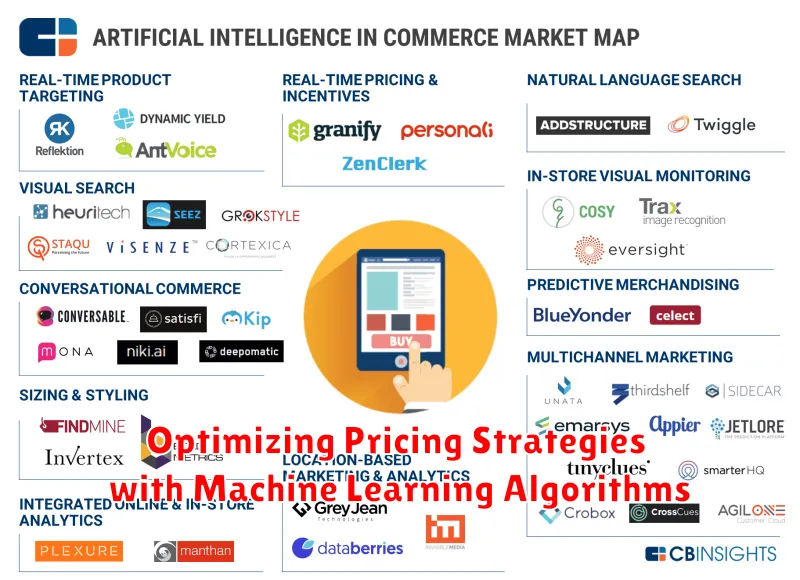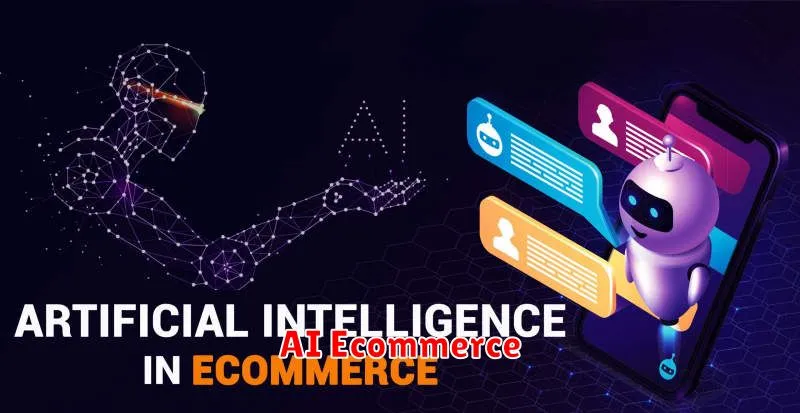In the fast-paced world of e-commerce, standing out from the crowd is crucial for success. With competition fiercer than ever, businesses are constantly seeking innovative ways to optimize their operations and enhance the customer experience. Enter artificial intelligence (AI) and machine learning (ML), two transformative technologies that are revolutionizing the e-commerce landscape.
From personalized recommendations to automated customer service, AI and ML are empowering businesses to understand their customers better, streamline processes, and ultimately drive revenue growth. But how exactly are these technologies changing the game? In this article, we’ll delve into the key ways AI and ML are unlocking e-commerce success, exploring the benefits they offer and the exciting possibilities for the future.
Understanding the Power of AI and Machine Learning in Ecommerce
The e-commerce landscape is evolving rapidly, fueled by the power of artificial intelligence (AI) and machine learning (ML). These technologies are transforming how businesses operate, interact with customers, and drive sales. From personalized recommendations to automated customer service, AI and ML are revolutionizing the way we shop online.
AI and ML algorithms can analyze vast amounts of data, identifying patterns and insights that humans may miss. This data-driven approach empowers businesses to make smarter decisions, improving every aspect of their operations.
One key benefit of AI and ML is personalized experiences. By analyzing customer behavior and preferences, e-commerce platforms can deliver tailored product recommendations, personalized pricing, and targeted marketing campaigns. This leads to increased customer satisfaction, loyalty, and ultimately, higher conversion rates.
AI and ML also streamline operations, automating tasks like inventory management, order fulfillment, and fraud detection. This frees up human resources to focus on higher-value activities, improving efficiency and reducing costs.
As AI and ML technologies continue to advance, their impact on e-commerce will only grow. By harnessing the power of these tools, businesses can gain a competitive edge, improve customer experiences, and drive sustainable growth.
Personalized Product Recommendations for Higher Engagement
In today’s crowded online marketplace, standing out and capturing the attention of potential customers is more critical than ever. One powerful tool that e-commerce businesses are leveraging to achieve this goal is personalized product recommendations. Powered by AI and machine learning, these systems analyze vast amounts of data to understand individual customer preferences and provide tailored suggestions. By offering relevant and appealing recommendations, businesses can drive higher engagement, boost conversion rates, and ultimately, enhance customer satisfaction.
Imagine a customer browsing your website for a new pair of running shoes. Traditional recommendation systems might suggest other running shoes, but a personalized system goes beyond this basic approach. It analyzes the customer’s past purchases, browsing history, and even their location to provide recommendations that are truly relevant to their needs. Perhaps the customer lives in a mountainous region, so the system suggests trail running shoes instead of standard road shoes. Or maybe they have a history of purchasing shoes from a specific brand, so the system recommends similar options from that same brand.
The benefits of personalized product recommendations are significant. They can:
- Increase conversion rates by presenting customers with products they are more likely to buy.
- Boost average order value by encouraging customers to add more items to their carts.
- Reduce bounce rates by keeping customers engaged and interested in exploring your website.
- Foster customer loyalty by demonstrating that you understand their preferences and are offering them valuable solutions.
By harnessing the power of AI and machine learning, e-commerce businesses can deliver highly targeted and effective personalized product recommendations. This approach not only drives sales but also creates a more positive and rewarding customer experience, ultimately leading to greater success in the competitive world of online commerce.
AI-Powered Chatbots for Enhanced Customer Service

In the fast-paced world of e-commerce, providing excellent customer service is crucial for success. Customers expect quick responses, personalized interactions, and 24/7 availability. This is where AI-powered chatbots come in. These intelligent virtual assistants are revolutionizing customer service by offering numerous benefits.
AI chatbots leverage natural language processing (NLP) and machine learning (ML) to understand and respond to customer inquiries in a human-like manner. They can handle a wide range of tasks, including answering frequently asked questions (FAQs), providing product information, processing orders, and resolving simple issues. This frees up human agents to focus on more complex or sensitive issues.
One of the biggest advantages of AI chatbots is their ability to provide 24/7 availability. Customers can get instant support at any time, regardless of the time zone or day of the week. This improves customer satisfaction and loyalty. Moreover, these chatbots can learn and adapt over time, becoming more efficient and accurate in their responses.
AI-powered chatbots also offer significant cost savings. By automating routine tasks, businesses can reduce their reliance on human agents, leading to lower operating costs. Additionally, chatbots can handle a large volume of inquiries simultaneously, improving operational efficiency.
In conclusion, AI-powered chatbots are a powerful tool for enhancing customer service in e-commerce. They provide 24/7 availability, personalized interactions, and cost savings, ultimately leading to improved customer satisfaction and business growth.
Optimizing Pricing Strategies with Machine Learning Algorithms

In the competitive landscape of e-commerce, striking the right balance between profit maximization and customer satisfaction is paramount. Machine learning algorithms offer a powerful toolkit for optimizing pricing strategies, enabling businesses to leverage data-driven insights and achieve unprecedented levels of success.
Dynamic Pricing, powered by machine learning, allows businesses to adjust prices in real time based on factors such as demand, competitor pricing, inventory levels, and even customer behavior. This dynamic approach empowers businesses to capitalize on peak demand periods while remaining competitive during slower times.
Price Optimization Algorithms analyze historical data and market trends to identify the optimal price point for each product. These algorithms consider factors such as product attributes, customer demographics, and competitor pricing, helping businesses set prices that maximize revenue and profitability.
Furthermore, machine learning can help predict customer willingness to pay, allowing businesses to personalize pricing strategies for individual customers. By analyzing purchasing history, browsing behavior, and other data points, businesses can tailor pricing offers that resonate with each customer, increasing conversion rates and customer loyalty.
By embracing machine learning for price optimization, e-commerce businesses can unlock a new level of sophistication in their pricing strategies. This data-driven approach empowers them to make informed pricing decisions, enhance profitability, and ultimately drive business growth.
Fraud Detection and Prevention Using AI
In the ever-evolving landscape of e-commerce, where transactions happen at lightning speed, fraud detection and prevention have become paramount. Traditional methods often struggle to keep pace with the sophistication of fraudulent activities. Fortunately, Artificial Intelligence (AI) and Machine Learning (ML) are revolutionizing this field, empowering businesses to combat fraud with unprecedented efficiency and accuracy.
AI-powered fraud detection systems can analyze vast amounts of data, identifying patterns and anomalies that human analysts might miss. They can learn from previous fraudulent activities and continuously adapt their algorithms to stay ahead of evolving threats. This includes identifying suspicious transactions, detecting fake accounts, and preventing chargebacks.
The benefits of AI in fraud prevention are manifold. AI algorithms can process transactions in real-time, enabling immediate responses to suspicious activity. They can also automate tasks like account verification and risk scoring, freeing up human resources for more strategic initiatives. Ultimately, AI-powered fraud detection solutions help businesses minimize financial losses, protect their reputation, and enhance customer trust.
Streamlining Inventory Management and Supply Chain Operations
AI and ML are revolutionizing inventory management and supply chain operations by providing businesses with valuable insights into demand patterns, optimizing inventory levels, and streamlining logistics. Predictive analytics powered by AI enables businesses to forecast future demand with greater accuracy, allowing them to anticipate fluctuations and adjust inventory levels accordingly. This reduces the risk of stockouts or excessive inventory, minimizing storage costs and ensuring timely delivery to customers.
Automated inventory management systems leverage AI and ML algorithms to automate tasks such as order fulfillment, stock replenishment, and warehouse management. These systems can analyze data from various sources, including sales history, customer behavior, and supplier information, to determine optimal inventory levels and prioritize orders for faster fulfillment. This automation not only saves time and effort but also minimizes human error, leading to improved efficiency and reduced costs.
AI-powered supply chain optimization involves analyzing data from across the entire supply chain to identify bottlenecks, optimize routes, and improve overall efficiency. This includes real-time tracking of shipments, predicting potential delays, and proactively adjusting logistics plans to minimize disruptions. By optimizing the entire supply chain, businesses can reduce transportation costs, shorten lead times, and ensure timely delivery of products to customers.
In addition to these benefits, AI and ML also empower businesses to improve their customer service. By analyzing customer data, AI can provide personalized recommendations and anticipate customer needs, enhancing the overall shopping experience. This leads to increased customer satisfaction, repeat purchases, and brand loyalty.
In conclusion, AI and ML are playing a pivotal role in streamlining inventory management and supply chain operations, empowering businesses to achieve greater efficiency, reduce costs, and improve customer satisfaction. By leveraging these powerful technologies, e-commerce companies can unlock new levels of success and gain a competitive edge in today’s dynamic market.
Predictive Analytics for Data-Driven Decision Making
In the dynamic world of e-commerce, understanding customer behavior and market trends is crucial for success. Predictive analytics, powered by AI and machine learning, empowers businesses to make data-driven decisions that can unlock significant competitive advantages. By analyzing historical data and identifying patterns, predictive models can forecast future outcomes, offering valuable insights into customer preferences, demand fluctuations, and potential risks.
For example, predictive analytics can help e-commerce businesses:
- Optimize pricing strategies: Predict price sensitivity and adjust prices in real-time to maximize revenue.
- Personalize product recommendations: Analyze customer browsing and purchase history to suggest relevant products, enhancing the shopping experience.
- Forecast inventory levels: Reduce stockouts and overstocking by predicting demand and optimizing inventory management.
- Identify potential churn: Analyze customer behavior to identify those at risk of leaving and proactively implement retention strategies.
- Target marketing campaigns: Identify the most receptive audience segments for targeted advertising, maximizing campaign effectiveness.
By embracing predictive analytics, e-commerce businesses can transform data into actionable insights, driving strategic decision-making and achieving tangible results.
Visual Search and Product Discovery
Visual search is quickly becoming a game-changer for e-commerce businesses. This technology, powered by AI and machine learning, allows shoppers to search for products by uploading an image, rather than typing in keywords. This revolutionizes product discovery, offering a more intuitive and engaging experience for customers.
The benefits of visual search are numerous. It allows shoppers to find products they might not even know exist, by visually identifying similar items. This increases the chances of discovering new products and brands, leading to expanded product catalogs and increased sales.
For example, a shopper might see a stylish pair of shoes on a friend and want to buy a similar pair. With visual search, they can simply take a photo of the shoes and upload it to an e-commerce site. The AI will then identify similar products from the store’s inventory, providing a seamless and convenient shopping experience.
Furthermore, visual search can also enhance the overall customer journey. It allows shoppers to refine their search results by narrowing down options based on specific features, colors, or patterns. This results in a more personalized and efficient shopping experience, reducing the time it takes to find the perfect product.
In conclusion, visual search is a powerful tool that can significantly impact e-commerce success. By leveraging the power of AI and machine learning, businesses can create a more engaging and personalized shopping experience for their customers, leading to increased product discovery, sales, and customer satisfaction.
AI-Powered Personalization for Targeted Marketing Campaigns
In today’s fiercely competitive e-commerce landscape, personalization is no longer a luxury but a necessity. Customers are bombarded with information from various sources, making it crucial for businesses to stand out and deliver tailored experiences that resonate. This is where AI-powered personalization comes into play, transforming how brands engage with their audiences.
AI algorithms excel at analyzing vast amounts of customer data, including browsing history, purchase behavior, demographics, and even social media interactions. By leveraging this information, businesses can create highly targeted marketing campaigns that cater to individual preferences. Imagine receiving product recommendations that perfectly align with your interests, or personalized email offers that entice you with irresistible deals. This level of customization not only enhances the customer experience but also drives conversion rates and loyalty.
One of the most powerful applications of AI in personalization is dynamic pricing. AI algorithms can analyze real-time data to adjust prices based on factors like demand, competition, and customer behavior. This allows businesses to optimize pricing strategies for maximum profitability while still offering competitive deals.
Another key aspect of AI-powered personalization is product recommendations. By analyzing purchase history and browsing patterns, AI can suggest relevant products that customers might be interested in. These recommendations can be displayed on product pages, checkout pages, and even in personalized email campaigns. This not only helps customers discover new products but also increases the average order value and drives sales.
Furthermore, AI can be used to create personalized content, such as blog posts, articles, and email newsletters. By understanding individual preferences and interests, AI can tailor content to resonate with each customer. This ensures that content is engaging and relevant, leading to higher click-through rates and improved customer engagement.
In conclusion, AI-powered personalization is a game-changer for e-commerce businesses. By leveraging the power of AI, brands can create highly targeted marketing campaigns that enhance the customer experience, drive conversions, and foster loyalty. As AI technology continues to evolve, the possibilities for personalization will only grow, empowering businesses to stay ahead of the curve and achieve e-commerce success.
The Future of AI and Machine Learning in Ecommerce
AI and machine learning are rapidly transforming the e-commerce landscape. In the future, we can expect these technologies to play an even more significant role in driving success. AI-powered tools will become more sophisticated, enabling businesses to:
- Personalize the customer experience: AI can analyze customer data to understand their preferences and offer tailored recommendations, promotions, and even product designs. This leads to higher conversion rates and customer satisfaction.
- Optimize pricing strategies: AI can analyze market trends and competitor pricing to set optimal prices for products. Dynamic pricing strategies based on real-time data will become more common.
- Improve inventory management: AI-powered systems can predict demand fluctuations and optimize inventory levels, reducing stockouts and overstocking. This leads to cost savings and improved customer service.
- Automate marketing tasks: AI can automate tasks like content creation, email marketing, and social media management. This frees up time for marketers to focus on strategic initiatives.
- Enhance customer service: AI-powered chatbots can provide quick and efficient customer support, answering questions and resolving issues around the clock. This improves customer satisfaction and reduces service costs.
The future of e-commerce is undoubtedly intertwined with AI and machine learning. Businesses that embrace these technologies will be well-positioned to thrive in the increasingly competitive online marketplace.

